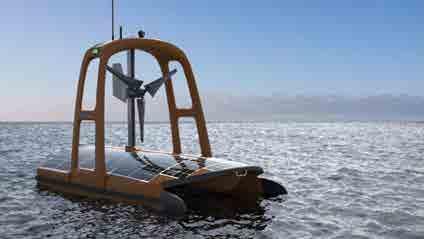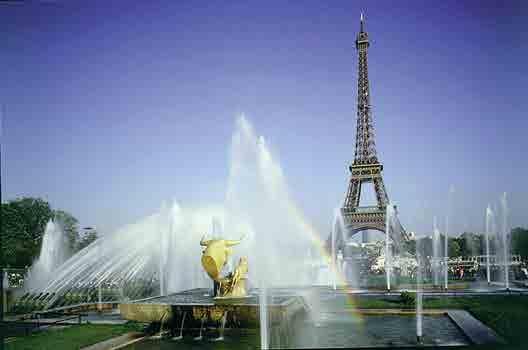
7 minute read
Technology spotlight Advances in technology
NEWS
TECHNOLOGYSPOTLIGHT
Advances in technology across industry
The Square Rigger turbine sets sail
The UK’s Tradewind Turbines has launched a revolutionary small wind turbine that incorporates sail technology. The use of sail technology means the Square Rigger captures much higher levels of the available wind energy than turbines of similar size.
The Square Rigger has a number of key design benefits: it is capable of high energy capture for its height (only 10 metres) and swept area; it is effective in low wind speed ranges, becoming operational in just 3 metres per second of wind; it is operational across a broader range of wind speeds than conventional turbine designs.
Particularly quiet in operation, the turbine is environment and wildlife friendly; the company’s first turbine order is to provide power to a medical clinic in a Kenyan game reserve; Tradewind sees huge potential demand, domestically and around the world, for on- and off-grid electricity production and for pumping applications in mining, in agriculture for drainage and irrigation, water provision, treatment, management, aeration, fish farming, desalination, conservation and associated sectors. Visit: www.tradewindturbines.com
Revolutionary kiln technology
Akiln piloting revolutionary technology that could cut energy costs for the ceramics industry by up to 30% is set to be unveiled. The equipment could help UK producers reduce carbon emissions at the same time as increasing profits and employment – and experts believe there could also be benefits for sectors that use advanced ceramics, such as healthcare.
Materials technology business Ceram has finished building the kiln at its Stoke-on-Trent headquarters after winning about £2.5 million from the government’s Regional Growth Fund last year. Previous research and laboratory trials found ways of reducing the temperature at which ceramics need to be fired. Now Ceram’s Low Energy Firing Project team has built a 25-metre-long (80 feet) commercialscale kiln to develop the technology further.
Dr David Pearmain, project manager at Ceram, said: “The potential of this work is really exciting. We think we can reduce firing times as well as temperatures, so there could be very, very significant advantages for the sector. Making ceramics is really energy intensive, and the sector is under a lot of pressure to cut consumption because of costs and environmental regulations.” Visit: www.ceram.com
New generation ocean robots


The next generation of ocean-going robotic vehicles will be developed by two cuttingedge technology companies from the south coast of England, working with the UK’s National Oceanography Centre.
ASV Ltd of Portchester and MOST (AV) Ltd of Chichester have won contracts under the government-backed Small Business Research Initiative (SBRI) to develop the vehicles – known generically as Long Endurance Marine Unmanned Surface Vehicles – that will carry out sustained marine research over long periods. The Technology Strategy Board and Natural Environment Research Council jointly fund the programme with supplementary funding of additional elements from the Defence Science and Technology Laboratory (Dstl).
When developed, the vehicles, which operate on the sea surface rather than at depth, will be invaluable platforms for gathering scientific data from the ocean over periods of several months. A wide range of sensors to take measurements beneath and above the ocean surface, together with satellite navigation tools, communications for command and control and for data transfer to shore, are all readily available. The vehicles will demonstrate several feasible technologies to provide the energy necessary for long deployment. Visit: www.noc.ac.uk
EURO-REPORT
FOCUS ON... France

Ian Sparks reports from Paris on the contrasting fortunes of France’s aero and auto industries.
European aviation giant Airbus has stolen a march on US rival Boeing by carrying out the maiden test flight of its new A350 – three days before the start of the Paris Air Show this month.
Airbus then swooped low over the crowds at the annual event in Le Bourget – to send out a clear signal to potential customers that their latest long-haul jet is suffering from no similar problems to the American firm’s trouble-prone 787 Dreamliner.
Boeing managed to get its Dreamliner off the ground at the show almost a week after Airbus, desperate to prove the plane, which was grounded after its late delivery in 2011 due to overheating batteries, is now fully safe.
Airbus has already won more than half of the market for medium-haul, singleaisle planes, a position that will be further strengthened by a preliminary agreement with Easyjet for 135 A320s – including 100 of the new A320 neo – for 8.9 billion euros and delivery between 2015 and 2022.
The deal is still dependent on the approval of shareholders, of whom Easyjet founder and principal shareholder Stelios Haji-Ioannou is known to be against the bulk buying of new aircraft. But Easyjet director general Carloyn McCall said: “Finally Airbus offered us the best deal, at a discounted price more significant than our order in 2002. It’s a very good result for Easyjet, our shareholders and our passengers.”
Airbus is now hoping that by positioning its A350 in the long-haul market between the popular Boeing 777 and the 787, it will steal business away from both. The Toulouse-based company also insists the plane will consume six per cent less fuel than the 787 and a quarter less than the 777, which has helped it already secure advance sales with British Airways, Qatar Airways and Hong Kong’s Cathay Pacific.
Meanwhile Boeing hinted at Le Bourget – the global aviation industry’s largest show – that it is also set to announce an up-to-date version of its existing 777, with wings made of the same fuel-saving composite material as the Dreamliner.
Boeing’s strategy is to offer customers a wider choice of long-haul airliners, Tom Enders, boss of Airbus parent company EADS, said: “It’s not necessarily the one who has more products who is also better positioned on the market.”
US-based aviation expert Richard Aboulafia told the French media at the show: “Airbus can, and will, argue that Boeing’s ability to execute is questionable and that the A350 is a better bet in terms of timing and availability.”
Auto industry woes
Meanwhile, France’s beleaguered car industry looks set to be overtaken by Britain as the second largest in Europe after Germany.
The European Automobile Manufacturers’ Association has reported that last year a total of 1.5 million cars were made in Britain, and has forecast that this figure could rise to two million by 2018, overtaking France’s 1.9 million output. Germany is still the dominant European car manufacturer producing 5.5 million vehicles a year.
Industry experts believe that increasing foreign demand, particularly from China, could see UK plants run by Jaguar Land Rover (JLR), BMW and Nissan race ahead of their French rivals. China is now JLR’s biggest market and the company has responded by building a factory there that will make 130,000 cars a year.
An EAMA spokesman said: “All the indications appear to be saying that Britain will be the second (largest car manufacturer) in a few years. It could happen as early as 2018.”
Nissan’s executive vice-president Andy Palmer added: “You could see the UK overtaking France if UK plants are at full capacity, which they are not far off being.”
In France, industry figures show a 12 per cent decline in new car registrations between January and May due to weak European demand, and just under half of all the 24,000 jobs lost in 2012 were in the automobile sector. Renault also said recently that it plans to axe 7500 jobs across France over the next three years, and PSA Peugeot Citroen has said it must cut 8000 jobs as part of a ‘restructuring project’ that includes plans to close down its oldest plant to the north of Paris. Industry minister Arnaud Montebourg tried to persuade PSA Peugeot to reconsider its plans, but eventually even he admitted that the closure of the plant was ultimately ‘unavoidable’.
The desperation of French car dealers was also revealed in June with a garage in the southern city of Nîmes began offering a buy-one, get-one-free deal, telling customers if they buy a four-wheel drive Hyundai ix35 model for 29,500 euros, they get an i10 hatchback worth 10,000 euros for nothing. Buyers flocked to the garage and the 12 free cars were all snapped up in a few days.
Car dealer Olivier Mourier said: “We sold more cars in that week than we would in a normal month. The economy in France is flat-lining and most people do not have money to spend on new cars, which are already too expensive. We may have reduced our margins but we still made a small profit and we have gained clients and drawn attention to our dealership.
“It is only a shame that we were not able to make the offer with French-made vehicles, and boost our own country’s industry. It needs it.” n










